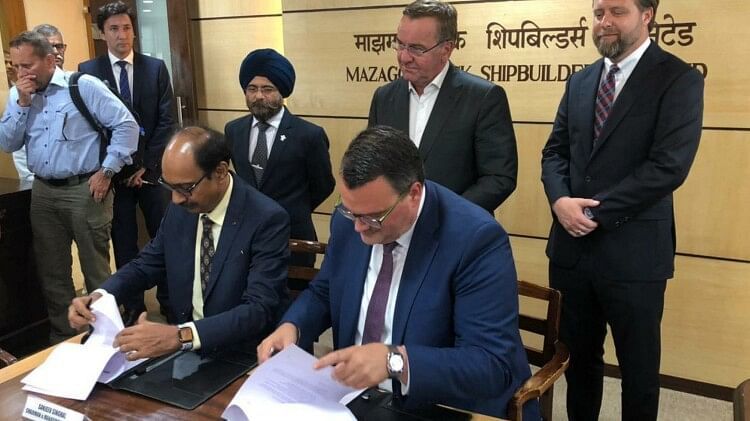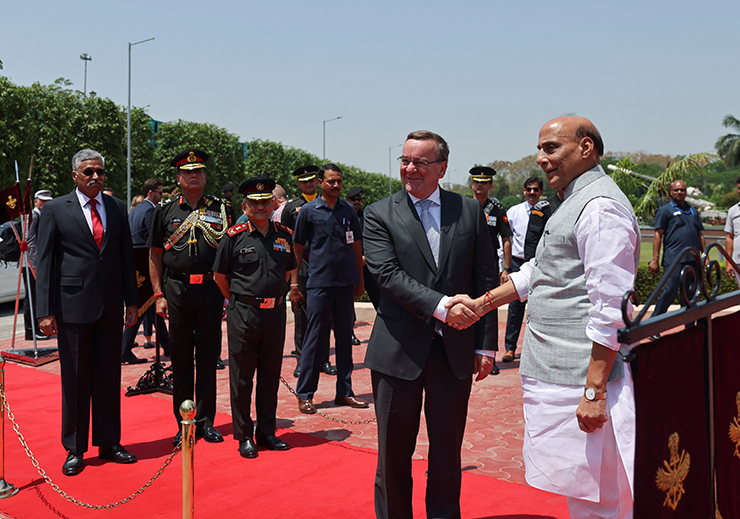
India and Germany moved a step closer to building submarines for the Indian Navy at Mumbai based Mazagon Dock Limited (MDL) with an initial agreement signed on 7 June. Under the agreement Germany’s ThyssenKrupp Marine Systems (TKMS) and MDL are expected to join hands for the $ 5.2 billion deal. TKMS would provide engineering and design of the vessels while MDL will be responsible for local construction and delivery if the deal is finalised. India is looking to order six diesel-electric submarines.
Germany’s Defence Minister Boris Pistorius, who is visiting India these days, said that securing the submarine contract would further strengthen Germany’s strategic partnership with India besides auguring well for the German industry too.
Defence Minister Rajnath Singh held wide-ranging talks with his German counterpart Boris Pistorius in New Delhi focussing on ways to expand bilateral defence and strategic ties. Rajnath Singh emphasised the need to look for opportunities in the defence production sector, including German investment in defence industrial corridors in Uttar Pradesh and Tamil Nadu.
The Indian and German defence ministers reviewed the ongoing bilateral defence cooperation activities and explored ways to enhance the collaboration, particularly defence-industrial partnership. Rajnath Singh suggested that India’s defence industry could participate in the supply chains of German defence industry and add value to the ecosystem.
India’s plan to procure six stealth conventional submarines at a cost of around Rs 43,000 crore figured in the talks and Boris Pistorius showed Germany’s interest in the project. “We are talking about a deal of TKMS, about six submarines but of course the procedure is not finished yet but I think the German industry is at a good place in that race,” the German minister told the media at the end of his meeting with Rajnath Singh.
Amid growing global concerns over China’s increasing military muscle flexing in the region, Boris Pistorius said that Germany could do more in the Indo-Pacific through partnership with India.
“I think we should and we can, and we ought to do more in that region (Indo-Pacific) in a partnership with India. Because we are approaching times when we cannot really predict what is going to happen in the next few years,” Pistorius said.
Commenting on Indo-Pacific, Pistorius said Europe could play role in the Indo-Pacific region. “We need strategic partners like Indonesia, like India, for example, to make sure that the law of free navigation and the free trading routes will be achievable during the next decade too,” he said.
“We have totally agreed about the German and European role in the Indo-Pacific. We agreed that more engagement of Europe and Germany is necessary to play a relevant part in that game – it is not a game, but you know what I mean,” he stated.

Talking about Germany’s role in the Indo-Pacific, Pistorius indicated that his country will deploy military assets during military exercises in the region next year as well, and added that the Indian side also appreciated the Indo-German military exercises. “We were both of the same opinion. We need more cooperation, literally, not just by exercises but also by cooperation in the defence industry elements and we are working on it, for example, regarding the submarines, but also regarding other materials we are talking about,” he said.
German Ambassador Phillip Ackermann said in October last that India should play the role of a ‘guide’ in the overall global efforts to ensure a free, open and rules-based Indo-Pacific. In addition, Germany wants European defence companies to step up efforts to supply New Delhi with modern military gear as a way to help the Indian government wean off its arms dependence on Russia and act as a bulwark against China’s growing diplomatic and military assertiveness.
The Indian Navy has deployed TKMS submarines earlier too and they fared better than those built by South Korean Daewoo and Spanish Navantia submarines. TKMS is considered as a preferred manufacturer for Project-75(I), the Request for Proposal (RfP) for which has been extended until August this year. Project 75 (I) has been stuck for a long time due to some technical and legal issues.
The proposal for the submarines through the government-to-government route was discussed first during the visit of German Chancellor Olaf Scholz in February this year. In 2020, the Defence Acquisition Council (DAC) shortlisted two Indian partners for Project 75 (I) — MDL and Larsen & Toubro (L&T). These were the first to be processed under the Strategic Partnership (SP) model of the Defence Procurement Procedure (DPP). The original five foreign contenders in the race for Project 75 (I) included: Naval Group (France), Navantia (Spain), Rosoboronexport (Russia), ThyssenKrupp Marine Systems (Germany) and Daewoo Shipbuilding & Marine Engineering (South Korea).
The RfP for the six submarines was issued way back in July 2021 to two Indian companies – MDL and L&T. These two Indian companies were given 12 weeks to respond. However, since then it has been extended several times and as of now the last date to respond to the tender is in August this year.
Project 75 (I) of the Indian Navy has run into problems due to several issues related to specifications of the Air Independent Propulsion (AIP) module. It has been specified that the foreign company bidding for the project should have an operational AIP with an endurance of two weeks. Naval experts say that the AIP module is significant for conventional submarines as it allows them to remain submerged for a longer duration. This means as a force multiplier it reduces the chances of a submarine being detected and the AIP increases their endurance.
DRDO has developed an AIP, expected to be installed on the Scorpene class submarines of the Indian Navy when the boats come up for retrofit next year onwards. The Indian Navy has 16 conventional submarines currently in service. These include seven Russian Kilo-class submarines, five French Scorpene-class submarines and four German-origin HDW submarines.
-The writer is a Delhi-based freelance journalist who has been connected with the various national and international newspapers for three decades.








